November 25th, 2014 § § permalink
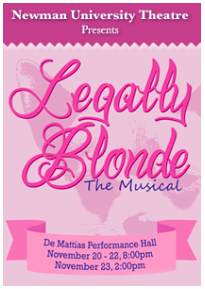 To say that Newman University’s production of the musical Legally Blonde was performed with its book and lyrics intact this past Saturday and Sunday would seem to be a wholly unremarkable event. But because that wasn’t the case at Thursday and Friday’s shows, the fidelity of the latter two performances is rather more intriguing. How did a university production suddenly shift away from censorship halfway through a four performance run? How, to paraphrase a lyric from The Producers, did Legally Blonde go right?
To say that Newman University’s production of the musical Legally Blonde was performed with its book and lyrics intact this past Saturday and Sunday would seem to be a wholly unremarkable event. But because that wasn’t the case at Thursday and Friday’s shows, the fidelity of the latter two performances is rather more intriguing. How did a university production suddenly shift away from censorship halfway through a four performance run? How, to paraphrase a lyric from The Producers, did Legally Blonde go right?
* * *
Newman University in Wichita, Kansas is a Catholic school with an undergraduate enrollment of 2,795, according to data from the U.S. News and World Report online rankings. It was founded by a religious order, the Adorers of the Blood of Christ as a women’s college in 1933, becoming co-ed in 1965.
The theater program at Newman is in just its fourth year. It was only in 2013 that students could declare as theatre majors, and the program currently has 18 majors and 12 minors. The school boasts two theatres and the theatre program produces four shows each year. Past productions include Lend Me A Tenor, Iphigenia in Aulis and in Taurus, Measure For Measure, and this fall’s Buried Child. Director of Theatre Mark Manette notes that there have been some rumblings about the content of some of the department’s productions in the past, including sexual content in Tenor and Pippin, citing one 2012 letter to the school newspaper saying that the school was producing plays with “a heaping helping of sexual innuendo.”
In announcing Legally Blonde, Manette felt he was choosing a mainstream, modern show for his students, aware that it is one of the most popular musicals in high school theatre. Save for making some very minor script emendations – “god damn” is a problem at a faith-based university, for example – the show went into rehearsals using the script as written. In the words of senior C.L. Smet, a theatre major who was cast as Paulette, “There were very light hints of censorship early on, but only the type of things that we are used to. In most shows we are asked to take out all instances of using the lord’s name in vain because we go to a Catholic university.”
* * *
Manette’s purview over the theatre department does not require him to submit his play selection for approval to the university. But with rehearsals underway, he was called to the Provost’s office on November 6, in order to address rumors that had begun to swirl about the content of Legally Blonde.
“When I was called into the office I was told that our production featured live masturbation, drug use, and two guys kissing,” said Manette. “My response was that the show features none of these things. But the seed of the rumors could be traced to the two changed lines: ‘Masturbatory emissions’ and ‘Get you high and laid’.”
Although Manette clarified the show’s content, he was still asked to make changes to the script. “I was told that I had to make the changes or else,” said Manette. “I did send a letter to the Provost stating that I had signed a contract not to make any changes to the script. He took that up the ladder, so to speak, and told me to go forward with making changes.”

C.L. Smet and Trevor Farney in Legally Blonde at Newman University (Photo courtesy of Newman University)
According to Smet, “Nothing seemed weird until a few days before tech week started, when individual cast members started being pulled aside and told that we had to change lines. For instance, my line ‘What’s she got that you don’t got, three tits?’ had to be changed to ‘three boobs’ this was a very minor change compared to many others but was still frustrating and unnecessary right before tech week. We were told by our director, music director, and the head of our department that these changes were from the administration directly. We were told that several higher-ups…were lodging complaints about the content.”
“We were also told repeatedly not to raise hell about the issue, because if we were to dig too deep we might cause more harm than good,” Smet related. “Obviously, however, we decided to pursue the matter. I was one of the loudest about my disappointment with the administration. I attempted to have a meeting with the President of our college. However, when I told them it was regarding Legally Blonde censorship, I was told she ‘didn’t speak to students,’ which I find very hard to believe. Many other students were confused and bothered by the censorship. A few of them were willing to just lay low and let it pass, but most of my fellow theatre majors saw the utter illegality of the changes and wanted to do something to help. Apart from the legal issues, many students were just sad that at the college level we were expected to perform a watered-down play, as if the world would end if somebody say “masturbate” on stage. It was a very frustrating and confusing time for everybody involved.”
* * *
 On the evening of the first performance, the school newspaper, The Vantage, published its weekly print edition with a lead story on the censorship of the Legally Blonde text. The story was assigned by the paper’s editor-in-chief, senior Matt Riedl – who happened to be a member of the Legally Blonde ensemble.
On the evening of the first performance, the school newspaper, The Vantage, published its weekly print edition with a lead story on the censorship of the Legally Blonde text. The story was assigned by the paper’s editor-in-chief, senior Matt Riedl – who happened to be a member of the Legally Blonde ensemble.
“It was my decision as editor-in-chief to pursue the story,” said Riedl. “It wasn’t something that was being brought out by the administration. We thought it was our responsibility. Every viewpoint can be voiced. There had been a few voices that had been pro-censorship, but we thought it was important that every viewpoint be represented.”
The story by Delaney Hiegert, ran with the headline “Legally Blonde Censorship Rankles Cast Members,” as well as a subheadline, “Illegally Changed?” It cited Provost Michael Austin confirming that the show would be a censored version.
There were at least six lyric changes to the musical, as well as multiple dialogue changes, in order to make the play more appropriate for all audiences, he said. The changes involved taking out any sexually derogatory remarks, references to sex and drugs, any use of the word “Christ,” and most all cursing.
For instance, Elle Woods’ line “masturbatory emissions” has been changed to “accidental emissions,” and Professor Callahan’s line, “Get you high and laid,” has been changed to “Get you entertained.”
“When we do plays, we are inviting not just the campus, but the community to come watch,” said Austin. “We have to be very careful to represent the values of the institution.”
The Vantage article spoke not only to the changes to Blonde, but the greater potential impact of the censorship on the theatre program. Quoting freshman Trevor Farney:
“I loved being a part of Buried Child. I love the directors and the people I’ve gotten to work with,” Farney said. “But I don’t want to act in something that’s just going to be a watered-down version of what it should be. In Legally Blonde, the censorship is annoying but it doesn’t hurt the production that much. But if the censorship continues, I don’t even know if I’d want to stay in the program. And that’s a shame.”
The Vantage story made the alteration of the Blonde script a campus-wide issue. Riedl cited that the piece received 1500 page views on the paper’s website, in contrast to the prior month’s top story, which had only 700. He noticed that in some places, in particular the theatre’s lobby, someone had flipped the papers upside down in their racks, so that the headline wouldn’t show. He said that his girlfriend reported sitting in the theatre pre-show and watched as many people read the paper’s front page.
“The article in the Vantage was huge,” said Smet. “It had a massive impact around campus and the entire Wichita theatre community. The outpouring of support was awesome, and it encouraged the cast to continue fighting.”
* * *

Legally Blonde at Newman University (Photo courtesy of Newman University)
The first two performances of Legally Blonde at Newman contained the mandated cuts and substitutions imposed by the administration. But C.L. Smet says that change was already afoot.
“Once the Vantage article was published, cast members became even more open about not being okay with the censorship,” Smet said. “For our Saturday performance we returned 100% to the written word of the script – we did the play that was actually written. We joked that it was the first Legally Blonde performance we’d done, and after the show we all had a group bonding moment celebrating the uncensored show.”
Riedl described the decision in similar terms. “We decided to perform the musical in its full uncensored form on Saturday and Sunday,” he said. “It was kind of a group decision. We had a little meeting before our performance on Friday and we talked about it. The coverage was getting so widespread and everyone was talking about it so we decided we weren’t going to put up with it any longer. We were going to subvert the order to change.”
The student motivated changes don’t precisely jibe with the account from Provost Michael Austin.
“We ended up not making the changes,” said Dr. Austin. “They went on according to script. We looked at what might be possible but decided that we’d do it the way it was in the script.”
Austin did say that the issue was a major one for the school, saying it was “hotly debated and discussed.” He said that he attended the show on Sunday and that the show was performed as written, but could not speak to whether the complete text was in use at all performances.
Riedl professed surprise when informed that the administration had withdrawn its requests for text changes. “Really? That’s interesting,” he said. “Because I was under the impression it was a cast decision. There’s definitely some confusion there. I had not heard that. That’s very interesting.”
Riedl went on to recount a moment during the Saturday night show, during the song, “Blood in the Water.” “‘Get you high and get you laid’ was supposed to ‘get you entertained,’ he recounted. “From the stage, I heard someone whisper, ‘I thought that was supposed to be censored.’ It took some power to not break character from that.”
With somewhat conflicting stories about how the show was restored to its original text, Manette seemed to walk a careful line about what had taken place. He ascribed the choice to the students, noting that, “The people who had called for the censorship were not the ones behind the decision to do the show as written.”
* * *
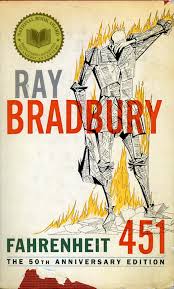 The issue of censorship is not an off-limits topic on the Newman University campus. It’s worth noting that all freshman this year were assigned to read Ray Bradbury’s Fahrenheit 451, the now classic novel in which censorship is taken to its ultimate extreme, with all books being sought out and burned by “fireman,” forcing lovers of knowledge into clandestine circles designed to preserve knowledge and texts.
The issue of censorship is not an off-limits topic on the Newman University campus. It’s worth noting that all freshman this year were assigned to read Ray Bradbury’s Fahrenheit 451, the now classic novel in which censorship is taken to its ultimate extreme, with all books being sought out and burned by “fireman,” forcing lovers of knowledge into clandestine circles designed to preserve knowledge and texts.
“There is artwork all over the building regarding censorship related to that novel,” Manette said. “Most members of the faculty and audience were appalled at the idea of censoring a production. Two pieces of art work across from the entrance of the theatre were mysteriously taken down on opening night – one was a nude – and they were miraculously replaced after the show closed. Coincidental?”
Smet told a similar story. “There was a great deal of other censorship happening in our arts department — nude paintings and “controversial” art work were removed from the hallways against the art department’s will. The entire fine arts sector of Newman was upset that they were being censored. Many people told us they supported us ‘fighting the power’.”
* * *
It’s unclear precisely where the complaints about Legally Blonde began and it’s also not certain exactly when or if approval was given to perform the show as written, as it was at the latter two performances. Precisely who in the administration really wanted the show edited remains somewhat vague, and no one with direct knowledge would speak to it on the record. But certainly the students took matters into their own hands, perhaps with the tacit approval of some members of the school administration.
Dr. Austin was quite clear about lessons learned from the imbroglio.
“Generally, I can say that the incident was not handled well,” he wrote to me, “for which I take full responsibility. We will not be suggesting changes to plays in the future, nor do we have any plans to exercise prior restraint on plays chosen by the Theatre Department.”
Austin’s statement is very encouraging, suggesting that Mark Manette will be able to continue to build Newman University’s theatre department and give his students the opportunity to work on a wide range of shows – as they were written. For the staff of The Vantage, they’ve gotten proof of the power of independent journalism to foster change. As for the cast of Legally Blonde? They’ve demonstrated that the words spoken on a stage matter, and that the words of authors come first.
* * *
Note: interviews for this article were conducted through a combination of voice interviews and e-mail correspondence. The word “said” may apply to both voice and e-mail communications.
October 16th, 2014 § § permalink
As headlines go, “A challenge for the arts: Stop sanitizing and show the great works as they were created” embodies what many of us were taught in school about the well-made essay: tell people what you’re going to tell them, offer support for your thesis, then tell them what you’ve told them. Unlike many instances where newspaper headlines misrepresent the content of the article that follows, I would say that Philip Kennicott’s article in The Washington Post on October 4th was accurately summarized. As a result, the unsettled feeling I had upon reading it remained with me as I read the piece itself, and long afterwards.
To select two paragraphs which explicitly reinforce Kennicott’s thesis, I offer first:
Censoring art to make it more palatable to contemporary audiences warps our sense of goodness, making our tolerance seem magically delivered rather than hard-won through centuries of struggle. It erases the complex, chaotic history of tolerance, especially problematic at a moment in history when the West is given to lecturing the “rest” on new and culturally alien extensions of compassion and decency across gender, sexual and sectarian lines.
Later in the piece, Kennicott asserts:
To preserve their independence, the arts need to stand resolutely aside from the increasingly complex rituals of giving and taking offense in American society. The demanding and delivering of apologies, the strange habit of being offended on behalf of other people even when you’re not personally offended, the futile but aggressive attempt to quantify offensiveness and demand parity in mudslinging — this is the stuff of degraded political discourse, fit only for politicians, partisans and people who enjoy this kind of sport.
I’m troubled by Kennicott’s charge that the arts in some way fail when they demonstrate sensitivity to prevailing social attitudes. While there are certainly many great works of art that contain misogynistic, racist, and classist attitudes (to name but three), to present them today and excuse them from criticism simply because they are “great” fails to in any way address how society has advanced when addressing inclusion, diversity and equality in the arts. It’s no small matter that the majority of the great works of the Western arts canon were also written by white men, and while that doesn’t negate their value, presenting them as if preserved in amber can be not only profoundly offensive but artistically stultifying.
I don’t happen to take to reworkings of classic works simply in order to fend off complaint; erasing the n-word from Huckleberry Finn struck me as patently absurd when a new edition doing just that appeared a few years ago. By way of example, the same holds true for productions of To Kill A Mockingbird which would eradicate that same word. In both cases, it’s a disservice both to the work and those who consume it. Frankly, I also don’t believe that any work should be, in total, deemed off limits because of changing mores.
But this conversation isn’t as binary as Kennicott presented, a choice between fidelity or censorship. Whether considering a work taught in classrooms or presented professionally on stage, one also has to factor in the interpretation and context, both separately and together.
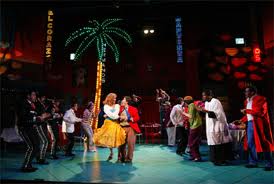
Mark Lamos’s production of The Taming of the Shrew at Yale Rep in 2003 (T. Charles Erickson photo)
There are many Jews who think The Merchant of Venice should never be performed, due to its ant-Semitic elements; I don’t happen to share their opinion. I would however be troubled to find a production that takes to heart the classification of the play as one of Shakespeare’s comedies, playing the shaming of Shylock for boisterous laughs. I know many people who feel the same way about The Taming of the Shrew, but a production by Mark Lamos at Yale Rep some years ago, featuring an all-male Latino cast, took the casual misogyny of the play, once seen as comic, and transmuted it into an exploration of modern male sexual identity, holding the play at a distance to be examined through a modern framing device, rather than asking us to accept the humbling of Kate as a just dénouement. Given the volume of Shakespeare productions every year, I imagine there are numerous interpretations which don’t bowdlerize the language, but instead imbue the plays with new insight; the Donmar Warehouse’s all-female Julius Caesar and Henry IV surely are important examples.

Mhlekazi Andy Mosiea as Tamino in Isango Ensemble’s The Magic Flute (Keith Pattison photo)
As I contemplated this issue, I happened upon online information about a South African production of The Magic Flute by the Isango Ensemble, currently touring the U.S., which has an all-black cast; this presumably immediately alters the perception of the blackamoor Monostatos, who Kennicott used as a key discussion point. At the same time, I was reading a great deal about the Metropolitan Opera’s imminent production of The Death of Klinghoffer, which is at the center of enormous controversy over its depiction of an incident from the real historical past, but on which I can offer no opinion because I haven’t seen it; the controversy only points up the fact that it isn’t solely works from the distant past which can provoke.
Citing counter-examples production by production would be endless, so let me turn to the issue of context. When a class is taught or a company produces a work whose social attitudes reflect less enlightened views, it’s worth noting whether any framing is provided, for students or audience. If a teacher assigned Huckleberry Finn without prior discussion and comprehensive followup, I would question their tact and their skills; to foist the book on students sans preface would, I imagine, be very upsetting to students. The same holds true for reading or seeing The Merchant of Venice without addressing the status of Jews in Shakespeare’s era, in discussion or supporting materials. Exploring how or why we might see these works today, why they may hold value even when they contain retrograde views, seems essential. It won’t necessarily preempt controversy, but it certainly demonstrates that the people presenting the work understand its complexity and challenges, and that they hope to grapple with those challenges by presenting it in a new light.
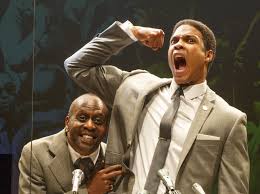
K. Todd Freeman and Ray Fisher in Fetch Clay, Make Man at New York Theatre Workshop
There are also examples of artists addressing work which would now be seen as offensive by placing it within the context of new works and adaptations. Screenings of films featuring Lincoln Perry, better known by the derogatory name Stepin Fetchit, who at one time was the most famous black actor in the movies, would likely be met by scorn if simply programmed without introduction or discussion of the actor and his character at the time he was working. However, playwright Will Power has worked to address Perry’s legacy by making him a leading character in the play Fetch Clay, Make Man, which places him alongside Cassius Clay (as he became Muhammed Ali) as two icons of African-American popular culture. It’s also unlikely that few theatre companies would produces the once hugely popular melodrama The Octoroon, with its far outdated racial views, but Branden Jacobs-Jenkins has deconstructed the work as part of his play An Octoroon, folding the original material directly into commentary on the same piece.
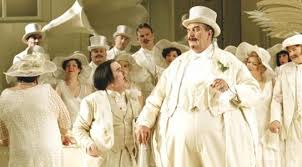
Jonathan Miller’s production of The Mikado for the English National Opera
There are many who defend The Mikado by citing Gilbert and Sullivan’s love of Asian culture and their efforts to represent it, but that often accompanies productions with white actors in yellowface; this ongoing controversy arose once again this summer in Seattle. But 28 years ago director Jonathan Miller found a way to present the work by resetting it in a seaside English resort, allowing the characters in what was widely known to be a spoof of the British aristocracy to be seen as exactly that, instead of antiquated racial caricatures. Again, context and interpretation is all.
I take exception to Kennicott’s characterization of “Cultural leaders who fret about art causing discomfort,” since it evidences a lack of comprehension of the role of those leaders. Yes, we should want all artistic ventures to be brave and bold, and to even take audiences places where they might not necessarily think to go. But they must do so in the context of serving their community, and indeed their many communities, because they do not and cannot exist in a vacuum where art cannot be challenged, often vigorously, in critiques and discussion simply because it has been declared art.
In every generation, art is a dialogue between artists and audiences, whether in performance or fixed texts and images; just as some works aren’t recognized or accepted when first created, there are also those which cease to hold meaning or whose meaning changes as society advances. If an artistic leader chooses to produce a season of vintage works with passé portrayals of women, people of color, people with disabilities, sexual orientation and so on as they might have first been seen, that is absolutely their right. But it is also the right of those who know the work or see it to challenge those decisions – though I abhor the kinds of threats that have emerged over Klinghoffer or Exhibit B at the Barbican, even as I support the rights of the voices which oppose those works to express their opinions. It is very easy in theory to say all works should remain fixed, but reality is another matter altogether.
There are no absolutes in this discussion. If works out of copyright are altered for this production or that, the work itself remains fixed for yet another day, and each example can be judged in relation to the original text. Inevitably, for every leader, whether teacher or producer, it is a matter of balancing a wide range of opinions and perceptions. I personally believe in art for art’s sake alongside art for audiences’ sake, but art for history’s sake serves only the past and runs the risk of propagating the failings of the past. In the arts, history should not be wholly erased, but it should first and foremost be the foundation upon which we build a better future.
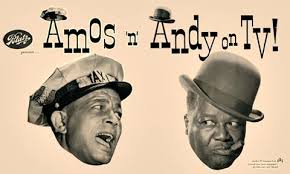 P.S. Among the examples Kennicott cites as falling prey to cultural sanitization is Amos and Andy. While it is true that the show was recognized as an avatar of racial insensitivity when viewed through the enlightened prism of the 1960s civil rights struggle, its absence from the airwaves or cable box is now due just as much to it no longer being commercially viable as to its racial stereotyping. That holds true as well for countless shows from the era, for reasons ranging from a changed society where the work is no longer seen as positive (such as my childhood favorites F Troop and I Dream of Jeannie) to their being in black and white and in the old TV aspect ratio. But Amos and Andy hasn’t been erased: you can view the TV episodes in the collection of the Paley Center for Media or buy the DVDs on Amazon and see for yourself why it’s now for the history books and academic, not mass entertainment.
P.S. Among the examples Kennicott cites as falling prey to cultural sanitization is Amos and Andy. While it is true that the show was recognized as an avatar of racial insensitivity when viewed through the enlightened prism of the 1960s civil rights struggle, its absence from the airwaves or cable box is now due just as much to it no longer being commercially viable as to its racial stereotyping. That holds true as well for countless shows from the era, for reasons ranging from a changed society where the work is no longer seen as positive (such as my childhood favorites F Troop and I Dream of Jeannie) to their being in black and white and in the old TV aspect ratio. But Amos and Andy hasn’t been erased: you can view the TV episodes in the collection of the Paley Center for Media or buy the DVDs on Amazon and see for yourself why it’s now for the history books and academic, not mass entertainment.
October 8th, 2014 § § permalink
A couple of weeks ago, yet another high school play was canceled over its content, this time at Santiago High School in Corona, California. Unlike the cases we often hear about, there was no press about the decision, no student protest, no faculty outcry. By the time I learned of it and communicated briefly on social media with a couple of students involved in the show, they were ready to just move on. The play was to have been performed in the latter part of this month.
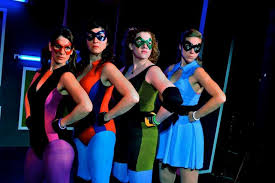
Hearts Like Fists at Theatre of NOTE
The play, Hearts Like Fists, was first produced only two years ago, debuting at Theatre of NOTE in Los Angeles in August 2012. It made its East Coast premiere in December of the same year at New York’s Flux Theatre Ensemble. Described in a synopsis as “a superhero noir comedy about the dangers of love,” it has already been produced at several high schools, including the Jewish Community High School of the Bay Area and at Sachse High School in Sachse, Texas; it will be done next month at TMI – The Episcopal School of Texas in San Antonio. As someone who sees real value in high school students having the opportunity to work on contemporary plays, I was very pleased to see that such a new work had been quickly found by schools.
How did I learn of the quiet cancelation in Corona? My high school theatre advocacy was mentioned in conversation on Facebook where the play’s author, Adam Szymkowicz, had shared the news, which he only learned of through students who had contacted him on Twitter. While a school representative, in response to my inquiry, said that the cancelation was due to the play not having received the proper approval, that is an oft-cited reason that typically differs from other accounts. But with no other accounts to go by in this case, I’m left only with a vague sense of something amiss, since I doubt that any teacher would go into rehearsal for a show without having followed the appropriate protocols. That would be a willful challenge to an administration, putting employment at risk.
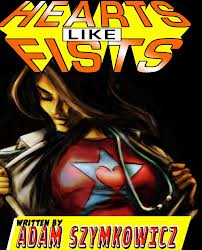
Advertising for production at Theatre of NOTE
In my opinion, the play has an enormous amount to offer school theatre troupes, as it addresses love, rejection, and female empowerment by inverting many comic book tropes, offering strong female roles in a stylized ensemble work with 9 or 10 roles. It does, however, contain stage violence and a handful of phrases that might well bring parents up short. Shorn of context, they include, “She knees him in the groin,” “I promised you angry sex,” and “I’m thinking about your body pressed against mine…I’m thinking about taking of all your clothes piece by piece…Then I would tear into you, with my hands and with my teeth. I would leave marks.”
While these phrases are not typical of the dialogue in Hearts Like Fists, and indeed these examples comprise the majority of what I thought could prove problematic for schools, one can imagine parents who might take exception to hearing this out of the mouths of 17-year-olds, even if the same students might discuss such things in their own lives or hear them even on broadcast TV. But as a result, the skittishness of administrators to allow them to be spoken in performance is not a complete shock. It’s a shame, really, because the play offers so much, but schools have long proven themselves to be risk averse.
I know Szymkowicz entirely from online interactions, stemming in large part from his impressive ongoing series of interviews with other playwrights, so I reached out to him about the cancelation, both before and after reading the play. Via e-mail, I asked Szymkowicz about the fact that in his Facebook dialogue, he seemed disinclined to make an issue of the cancelation.

Adam Szymkowicz
“As a playwright I am used to plays being postponed or cancelled for various reasons,” he replied. “Productions appear out of nowhere and sometimes just as mysteriously, planned productions don’t happen. I’m not saying it’s a fun thing about being a playwright but at this point I’m used to it. It never occurred to me that I have any power in whether or not planned productions do actually happen. Either people want to do a play or they don’t. I can’t make people do my play just because they said they would.” Szymkowicz noted that the show has had 10 productions, with four more coming up, and would soon be his most produced work.
Had he ever thought about Hearts Like Fists as a play for high schools, I wondered. “No,” was his simple reply. “It was a commission for South Coast Repertory. But I specifically didn’t have cursing in it because of how sensitive it seemed that Orange County audience was to curse words based on the reading of another play I had there. The fact that high schools have been doing it is a happy accident.”
But, in hindsight, does he believe there are facets of the play that particularly speak to high school performers and/or audiences? “I think loving the wrong person is an experience a lot of people have in high school,” he observed. “Also being a secret superhero (metaphorically) or having super powers not yet fully expressed. All general love confusion. High school is, for some, a confusing time.”
As is the case with a number of newer musicals, I wondered if he would consider authorizing a high school version of the show, with his own content edits. “I looked at the play once,” he wrote, “a year or so ago, with an eye to that, but I couldn’t figure out how to make tamer versions of certain scenes still work.”
Given the few phrases that might well give schools pause, I wondered whether Szymkowicz had considered that schools that have done or will do the show might be making their own, unauthorized edits, and how he would feel about that. He replied, “I wouldn’t like that and, of course, as you know, contractually they are forbidden from doing so.”
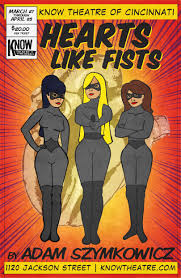 However, he wasn’t opposed to school editions on principle, saying, “If it doesn’t harm the play, sure. I am glad high schools are doing more challenging work and pushing boundaries and creating conversations. I worry about work that is sanitized past the point of having meaning or worth. But if you as a writer can take out something too adult (not that we all agree on what that is) but still have a play you are proud of, more power to you. Some wonderful plays are done frequently at the high school level.”
However, he wasn’t opposed to school editions on principle, saying, “If it doesn’t harm the play, sure. I am glad high schools are doing more challenging work and pushing boundaries and creating conversations. I worry about work that is sanitized past the point of having meaning or worth. But if you as a writer can take out something too adult (not that we all agree on what that is) but still have a play you are proud of, more power to you. Some wonderful plays are done frequently at the high school level.”
Finally, I asked Szymkowicz whether there was anything he’d like to say to the students, or to the administration, about the play being canceled.
“I spoke to a few of the students over Twitter who seem heartbroken and sent my regrets that this happened after they had already started rehearsals. I suspect the administration thought it would harm his/her community in some way to do this play. I think it is a bigger harm to not let them do the play. But look. I’m a playwright, not an administrator. I think theater is a good thing. I think communication is always better than shutting down conversations that make us uncomfortable. And honestly I also think my play is kind of tame. I suspect if these kids wrote plays themselves they would be much more upsetting or explicit than my play.”
I happen to agree strongly with Szymkowicz that communication is better than cancelation, and I believe that somewhere in the process of play selection, the start of production at Santiago High and the cancelation, some essential communication was missed. I admire the teacher who wanted to bring new work to her students and I respect the playwright for his decision that any alteration in the play would be to its detriment, and that even in high schools, he wants to see his play done as written, which is his absolute right. Much as I’d like to figure out if there’s a villain here, I can’t. And, sadly, circumstances have insured that Szymkowicz’s villain, the rejected, lovelorn Doctor X won’t be found at Santiago High either.
September 19th, 2014 § § permalink
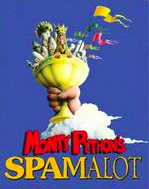 I am angry and I am sad. But I am not entirely surprised.
I am angry and I am sad. But I am not entirely surprised.
Earlier this morning, Dawn Burch, drama director at South Williamsport Area Junior/Senior High School in Pennsylvania, was fired from her position. By e-mail. The reason given? “Job performance.”
It doesn’t take a detective to figure out what’s really going on. At the beginning of July, Burch asserted that her musical choice for this school year, Spamalot, had been nixed by the school due to its gay content. School officials vehemently denied that was the case.
In late August, Keystone Progress and I received copies of school e-mails between Burch, principal Jesse Smith and superintendent Mark Stamm regarding the decision. An e-mail from Smith from the end of June cited “homosexual themes” as the reason for canceling the show.
So now, less than a month after the administration’s efforts to hide their own actions were revealed, Burch suddenly loses her job. Save for holding auditions and beginning rehearsals for the school’s fall play, Alice in Wonderland, she has barely undertaken her job for this year, as prior to that it was summer break. When exactly did these job performance issues come to light? Awfully coincidental, no?
I believe Burch has been fired for telling the truth. Burch has been fired for not being willing to accept that gay life was not something to be hidden away, not something to be ashamed of, not something to be afraid of. It hardly takes another Right-to-Know request to put together the pieces.
I wanted to interview Burch about what has transpired, but she was too emotional to say much more than the bare facts of the firing as cited above, except to express concern about what would happen to the fall play and to the students already cast, who were looking forward to being in the show. Will it still happen? Who knows. But even on a difficult day, Burch’s main concern was for the students. She may not be a teacher (and therefore has no tenure), but putting the needs of students first is a sign of an excellent teacher, accredited or not. There are many ways to teach.
It’s worth noting that at a Board of Education meeting a week and a half ago, conversation regarding the Spamalot issue was expressly deferred until this coming Monday, September 22. So it’s quite remarkable that this decisive action took place even before the South Williamsport community could discuss the issue publicly; that they were denied any opportunity to speak before the issue was resolved and that it became a referendum on Burch’s performance, rather than about condoning homophobia and then hiding that fact. Will the topic still be discussed Monday night? Perhaps. But there’s going to be a lot of discussion in the past tense when it comes to Burch.
Perhaps we’ll all be surprised. Perhaps overwhelming support for Burch will be in evidence on Monday night. Perhaps the Board of Ed members will discover that this is an issue that will be a factor when they run for reelection. Perhaps parents will make clear that they can’t trust the word of the board chair, the superintendent and the principal, given their efforts to obscure the truth in this situation. Perhaps the press will cover the fallout of this firing with rigor and depth, and a truer picture will emerge.
I don’t know how the students will feel, or what they’ll be told about the loss of their drama director. I don’t know how they’ll react, or if they will at all. But just as kids are smart enough to intuit a great many things from a very early age, I suspect many of them are going to realize that they’ve just been given a lesson in right and wrong, in honor and duplicity, in the politics of fear and silence. They’ve seen just how badly their elders can behave in the name of protecting them. I hope they’ll see through it as well.
And I hope they’ll realize that Dawn Burch is a hero. I think plenty of people already do.
 To say that Newman University’s production of the musical Legally Blonde was performed with its book and lyrics intact this past Saturday and Sunday would seem to be a wholly unremarkable event. But because that wasn’t the case at Thursday and Friday’s shows, the fidelity of the latter two performances is rather more intriguing. How did a university production suddenly shift away from censorship halfway through a four performance run? How, to paraphrase a lyric from The Producers, did Legally Blonde go right?
To say that Newman University’s production of the musical Legally Blonde was performed with its book and lyrics intact this past Saturday and Sunday would seem to be a wholly unremarkable event. But because that wasn’t the case at Thursday and Friday’s shows, the fidelity of the latter two performances is rather more intriguing. How did a university production suddenly shift away from censorship halfway through a four performance run? How, to paraphrase a lyric from The Producers, did Legally Blonde go right?
 On the evening of the first performance, the school newspaper, The Vantage, published its weekly print edition with a lead story on the censorship of the Legally Blonde text. The story was assigned by the paper’s editor-in-chief, senior Matt Riedl – who happened to be a member of the Legally Blonde ensemble.
On the evening of the first performance, the school newspaper, The Vantage, published its weekly print edition with a lead story on the censorship of the Legally Blonde text. The story was assigned by the paper’s editor-in-chief, senior Matt Riedl – who happened to be a member of the Legally Blonde ensemble. The issue of censorship is not an off-limits topic on the Newman University campus. It’s worth noting that all freshman this year were assigned to read Ray Bradbury’s Fahrenheit 451, the now classic novel in which censorship is taken to its ultimate extreme, with all books being sought out and burned by “fireman,” forcing lovers of knowledge into clandestine circles designed to preserve knowledge and texts.
The issue of censorship is not an off-limits topic on the Newman University campus. It’s worth noting that all freshman this year were assigned to read Ray Bradbury’s Fahrenheit 451, the now classic novel in which censorship is taken to its ultimate extreme, with all books being sought out and burned by “fireman,” forcing lovers of knowledge into clandestine circles designed to preserve knowledge and texts.













